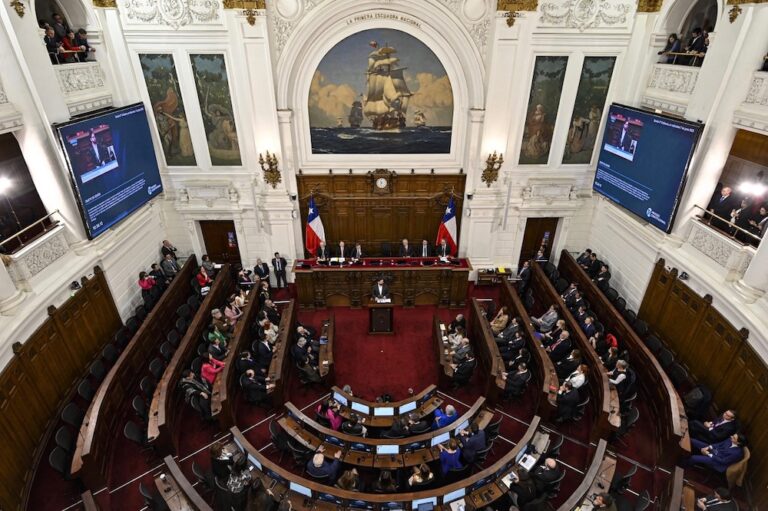(IAPA/IFEX) – The following is a 13 June 2005 IAPA press release: IAPA champions access to information and calls for elimination of insult laws in Chile Santiago, Chile (June 13, 2005) – The Inter American Press Association (IAPA) today urged Chilean congressmen to approve a law on access to public information, eliminate insult laws, and […]
(IAPA/IFEX) – The following is a 13 June 2005 IAPA press release:
IAPA champions access to information and calls for elimination of insult laws in Chile
Santiago, Chile (June 13, 2005) – The Inter American Press Association (IAPA) today urged Chilean congressmen to approve a law on access to public information, eliminate insult laws, and reject constitutional reforms on private and public life that encroach on freedom of the press.
During the Legislative Conference on Freedom of the Press, organized by the IAPA today in Santiago, the president of the hemispheric organization, Alejandro Miró Quesada Cisneros, presented to the President of the Chilean Senate, Sergio Romero Pizarro, a letter with recommendations that would strengthen press freedom, “a right that we understand as being not only for the media, but also for the general public.”
The recommendations on access to public and judicial information, and the elimination of insult laws were included in the document that was prepared during an IAPA workshop held in Santiago on June 8-9 with legal experts and Chilean media attorneys, including Miguel Gonzalez Pino, Juan Pablo Olmedo and Pedro Anguita. One of the five recommendations establishes the need to “eliminate insult laws found in Articles 263 and 264 of the Penal Code and Articles 276, 284, 416 and 417 of the Code of Military Justice, in accordance to a legal initiative proposed by the President of the Republic in September 2002, and currently in a joint commission of the National Congress.”
Sergio Muñoz, chairman of the IAPA’s Chapultepec Committee, remarked on the importance of the national meetings organized by the IAPA over the past three years with judges, legislators, attorneys, and journalists, aimed at discussing laws and regulations that affect and favor freedom of the press and the right to public information. “We believe, as journalists and citizens, that it is our moral and professional duty to continue to promote these fundamental concepts for the strengthening of democracies,” Muñoz said.
On access to public information, Senator Romero expressed his confidence in a legislative bill currently before a Senate committee, and said that it will counteract other laws in effect that he called “outmoded practices” that promote a culture of secrecy in public administration.”
On negative legislation in effect on the issue of access, the Senate President mentioned the Probity Law (Law 19,653) from December 1999, complimented by Law 19,880 of May 2003 that “have not achieved in practice the goal proposed by the legislature, and currently on the matter of access to public information, are really dead letters” He also stated that the Supreme Decree Number 26 from January 28, 2001 from the Ministry of the Secretary General of the Government have the government agencies themselves determining the confidentiality of the activities and documents of public administration, producing a “real culture of secrecy.”
On this subject, Juan Luis Sommers, president of the Chilean National Press Association, co-sponsor of the Conference, stated, “There is a paradox in the fact that in a democratic government there are items labeled secret or not to be seen by us, the common citizens, precisely those who elected them to office.”
On the legislative bill on the protection of honor and privacy of individuals, currently on second reading in the Senate, Mr. Romero indicated that they should find “a reasonable equilibrium” that favors the right to information over the right to honor and privacy.” He added that the “major legislative bills” of Congress require the active participation of the “academic world and the media” that will be consulted.
Senator Romero also mentioned the bill to reform the Penal Code and Code of Military Justice, currently in a joint commission of Congress, and stated that there are discrepancies in both chambers of Congress on the repeal of the insult laws.
On this issue, IAPA President Miró Quesada expounded on the opinion of the Inter-American Commission on Human Rights that in 1994 established that the “desacato” (insult) laws contradict Article 19 of the Pact of San Jose, Costa Rica. He added, “We believe it is necessary that Chile joins many countries that have eliminated insult laws, such as the recent cases of Honduras and Panama, as well as Costa Rica, Paraguay, Argentina and Peru.”
Claudio Grossman, a special IAPA guest, Chilean attorney and dean of the American University Washington College of Law, during the panel on “The Elimination of Laws that Restrict Freedom of the Press in Chile,” discussed the international justice system. He referred to important cases of the Inter-American Court of Human Rights and the Inter-American Commission on Human Rights that have established case law favoring press freedom, such as the cases of Chilean journalist Alejandra Matus, Costa Rican journalist Mauricio Herrera and Peruvian Baruch Ivcher.
The panel was comprised of Gonzalo Marroquín, chairman of the IAPA’s Committee on Freedom of the Press and Information, and the three Chilean attorneys, González, Olmedo, and Anguita, who criticized the provisions for special protection from “insult” enjoyed by government employees and supported passing a broad law on public information that forces all government agencies, including the judiciary, to provide information in a timely manner.
During a later discussion, responding to the opinion of a national congressman on the need to set limits on press freedom, Marroquín stated that “the best press law is the one that doesn’t exist,” although he stressed the importance of improving current legislation on matters of press freedom.
Lastly, the IAPA president announced that the next stage of the Chapultepec project would be a hemispheric debate on the ethical behavior of the press.
The IAPA delegation was comprised of Alejandro Miró Quesada Cisneros, “El Comercio”, Lima, Peru; Gonzalo Marroquín, “Prensa Libre”, Guatemala; Sergio Muñoz, “Los Angeles Times”; and Julio Muñoz and Ricardo Trotti, IAPA Executive Director and Director of Press Freedom, respectively.
The IAPA’s Chapultepec Project is funded by the Robert R. McCormick Tribune Foundation, based in Chicago.
For complete text of press release and recommendations, please visit http://www.sipiapa.org


